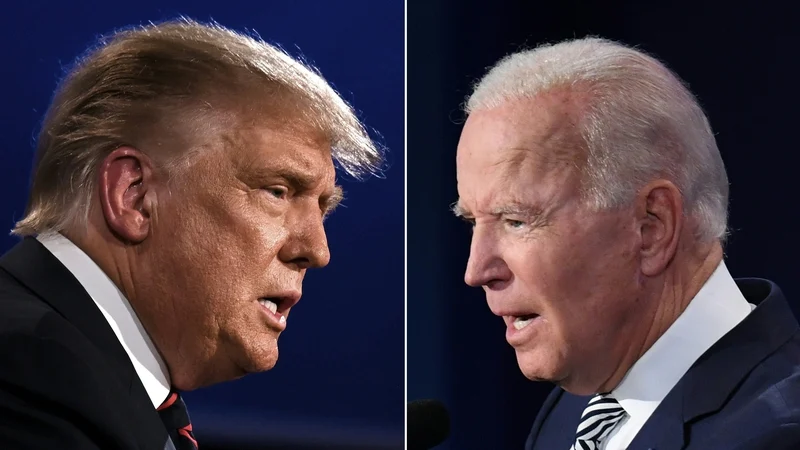Foreign
Trump, Biden march toward rematch after Super Tuesday wins

US President Joe Biden and former President Donald Trump swept to victory in state-wide nominating contests, setting up a historic rematch in November’s presidential election despite low approval ratings for both candidates.
Mr Trump won the Republican votes in a dozen states – including delegate-rich California and Texas – brushing aside former UN Ambassador Nikki Haley, his lone remaining rival, who no longer has a viable path to the nomination.
Her only win of Super Tuesday so far came in Vermont, Edison Research projected.
After a commanding performance across 15 states, where more than one-third of Republican delegates were up for grabs on Super Tuesday, Mr Trump had all but clinched his third consecutive presidential nomination, despite facing a litany of criminal charges.
Mr Trump and Mr Biden trained their focus on each other as the results became clear.
In a victory speech delivered at his Mar-A-Lago estate in Florida, Mr Trump focused on Mr Biden’s immigration policies and called him the “worst president” in history.
“Our cities are being overrun with migrant crime,” he said, though crime data does not support that assertion.
In a statement, Mr Biden again cast Mr Trump as a threat to US democracy.
“[The] results leave the American people with a clear choice: Are we going to keep moving forward or will we allow Donald Trump to drag us backwards into the chaos, division, and darkness that defined his term in office?” Mr Biden said.
Mr Biden had been expected to sail through the Democratic contests, though a protest vote in Minnesota organised by activists opposed to his forceful support of Israel attracted unexpectedly strong results.
The “uncommitted” vote in Minnesota stood at nearly 20% with more than half the estimated vote counted, according to Edison, higher even than the 13% that a similar effort in Michigan drew last week.
Mr Biden nevertheless won Minnesota and 14 other states, including a post-in vote in Iowa that ended yesterday.
He did suffer one loss, in the US territory of American Samoa’s caucus, where entrepreneur Jason Palmer won 51 votes to Mr Biden’s 40, according to the American Samoa Democratic Party.
Joe Biden sailed through most of the Democratic contests on Super Tuesday
Another campaign between Mr Trump, 77, and Mr Biden, 81 – the first repeat US presidential matchup since 1956 – is one few Americans seem to want.
Opinion polls show both Mr Biden and Mr Trump have low approval ratings among voters.
Immigration and the economy were leading concerns for Republican voters, Edison exit polls in California, North Carolina and Virginia showed.
A majority of Republican voters in those states said they backed deporting illegal immigrants. Mr Trump, who frequently denigrates migrants, has promised to mount the largest deportation effort in US history if elected.
The Super Tuesday results will intensify the pressure on Ms Haley to drop out of the race. She did not make a public appearance yesterday, and her campaign has not scheduled any events going forward.
In a statement, her spokesperson said the vote showed “there remains a large block of Republican primary voters who are expressing deep concerns about Donald Trump”.
In California, Democratic US Representative Adam Schiff, the lead prosecutor in Mr Trump’s first impeachment trial, advanced to the general election to succeed the late Democratic US Senator Dianne Feinstein.
His opponent will be former baseball player Steve Garvey, a Republican who finished ahead of Democratic US Representative Katie Porter.
California’s electoral system, in which the top two candidates advance regardless of party, prompted Mr Schiff’s campaign to employ an unusual strategy: he ran advertisements designed to boost Mr Garvey among Republican voters, figuring that Mr Garvey would likely be a weaker opponent in November than Ms Porter would be in the Democratic-leaning state.
In North Carolina, Mr Trump-endorsed Lieutenant Governor Mark Robinson won the Republican nomination for governor. Mr Robinson, who would be the state’s first Black executive, has drawn criticism for harsh comments about LGBTQ people, women and Muslims.
He will face Democratic Attorney General Josh Stein in what will be one of the most hotly contested governor races in the country.
Pop star Taylor Swift encouraged her fans to vote in a post on Instagram, though she did not endorse specific candidates. Mr Biden’s campaign is hopeful she will eventually back his candidacy, as she did in 2020.
Ms Haley’s challenge has highlighted some of Mr Trump’s potential general election vulnerabilities. She has reached 40% in some state contests, performing particularly well among independent, well-educated and suburban voters who could play a crucial role in battleground states in November.
About one-third of North Carolina voters said Mr Trump would not be fit to serve as president if he was convicted of a crime, while in Virginia, 53% said he would be fit for the office if convicted.
Mr Trump is scheduled to begin his first criminal trial on 25 March in New York, where he is charged with falsifying business records to conceal hush money payments to adult actress Stormy Daniels during his 2016 presidential run.
In addition to the New York case, Mr Trump faces separate federal and Georgia state charges for election interference, though it is unclear whether either case will reach trial before the 5 November election. He also faces federal charges for retaining classified documents after leaving office.
Mr Trump has pleaded not guilty in all four criminal cases.
Mr Biden faces his own weaknesses, including widespread concern about his age. He is already the oldest US president in history.













